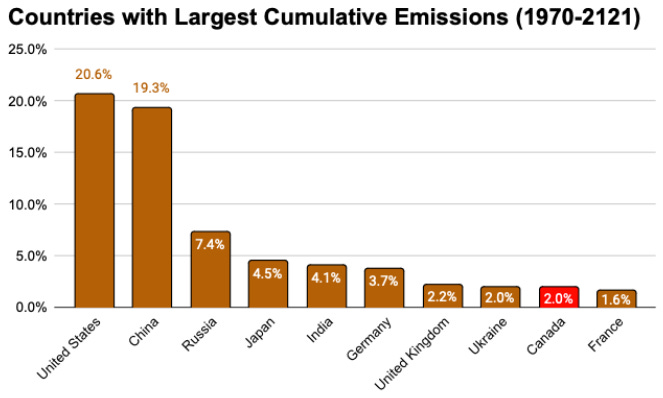Fix Climate Action 2: Why Cities Need to Act, Despite "What About China?"
Emissions are also local air pollution.
This is the second in a series of common sense solutions for climate action by cities. This article borrows from the ideas in James Kurz’s 2020 article But what about China and India? as well as the Climate Denier’s Playbook podcast episode But What About China!?
Climate deniers into climate defeatists
It’s getting harder and harder to be a climate denier. More and more people are experiencing first hand the impacts of extreme weather events, and it’s difficult to pin that on anything other than climate change.
So what’s a climate denier to do? Switch to being a climate defeatist!
Climate defeatists argue that there is little point in us taking climate action, since we’re only a drop in the bucket. China alone accounts for one-third of global emissions, so why should a country like Canada, let alone a single city within Canada, bother to take action?
There are four reasons to consider.
1. If all the Canadas said that
Canada accounts for 1.5% of total global emissions. So does that get us off the hook?
(And if we are off the hook, is Saudi Arabia — who essentially emit the same amount as Canada — off the hook too?)
Among 208 countries, only 10 emit more than Canada. Canada and the other 197 countries amount to close to 30% of total emissions.
When reaching net zero emissions is the goal, we can’t get there with only 70% of the team playing.
2. Our past record counts too
Countries have been emitting greenhouse gases for a very long time. The chart below looks at cumulative emissions over the past half century. On a historical basis, Canada is the 9th largest emitter. (On a per capita basis, Canada is the largest emitter among OECD economies).
In terms of responsibility to reduce greenhouse emissions, it’s hard to argue that historical emissions count for nothing.
This is particularly true when removing carbon from the air is one climate solution being put forward.
3. It’s why so many kids have asthma
Climate defeatists will try to blow off the two points above. So let’s bring the rationale for reducing carbon emissions closer to home.
The burning of fossil fuels accounts for about three-quarters of all greenhouse gas emissions. The other one-quarter comes from forest fires, agriculture and other sources.
In cities, we burn fossil fuels to operate our cars, heat our homes and, in some gases, power our factories and run our electrical grid.
Burning fossil fuels releases carbon emissions, but it also releases particulate matter — aka pollution — into the local air.
That particulate matter in the air is harming us. Air pollution is why 1 out of 10 Canadians has asthma — and close to 2 out of 10 teenagers.
Air pollution, primarily from burning fossil fuels, is also responsible for 15,000 premature deaths in Canada each year.
Many Canadians have experienced the impact that distant forest fires can have on their lungs. The burning of oil and gas, from our cars and homes, is simply a permanent less visible version of one of those forest fires.
Transition is about competitiveness
A fourth reason that climate defeatists should care about reducing emissions is to protect economic competitiveness.
Renewable energy is establishing a cost advantage over fossil fuels, which will only increase as clean energy scales and moves further down the cost curve, and as more carbon pricing schemes are implemented around the world.
Lower energy costs means a more competitive economy.
Part of the culture wars
Climate action has become part of the culture wars. Those cultural warriors are vocal, and get an undue amount of attention in these discussions.
Their message has had to shift from climate denialism to climate defeatism. They ask “why bother trying, if we are such a small part of the problem?”
Fortunately, the voices of climate defeatism are in a minority. Most people want to take climate action, and they want their governments to do the same.









The National Observer article from 2020 makes a good point. Worth noting that imports from China hace doubled since 2019. Up to approximately $89 Billion in goods we import from that country.
It's so great to point fingers at China's emissions as we stock store shelves across our nation with their goods and profit off the markup while at the same time profiting from the goods we export to them to burn or process. In Canada & US when I go into a dollar store or best buy or giant tiger or Canadian Tire or wallmart the shelves are full of things made in China.
The pollution required to make a lot of what we buy actually shows up on other countries emissions, not ours. China exports far more stuff to Canada than we export to them. Our top exports to China are <checks notes> Coal and petroleum. Nice. So that helps make some Canadians wealthier, then they burn our coal and gas (likey to manufacture just a small percentage of the stuff that ends up back on our store shelves) and all that goes on their emission data, not ours. Sneaky, eh?